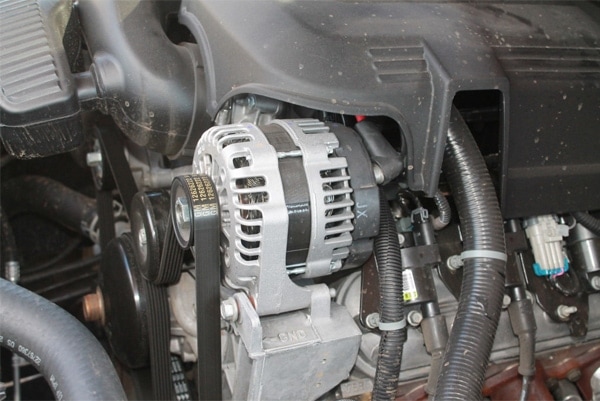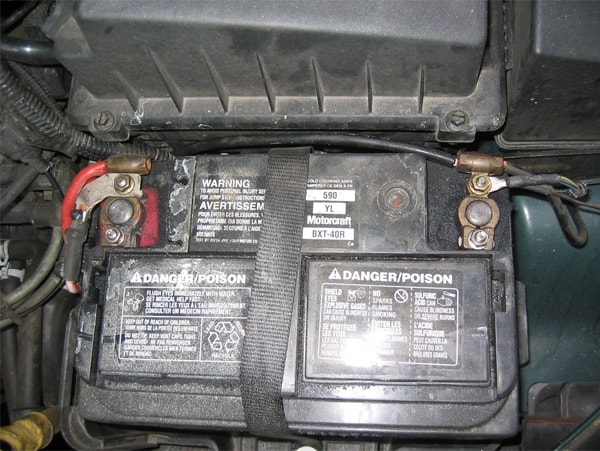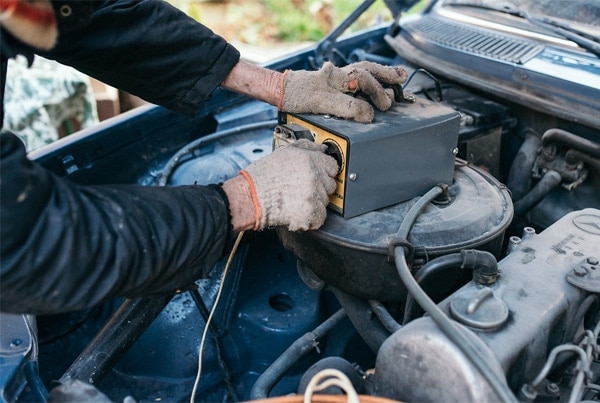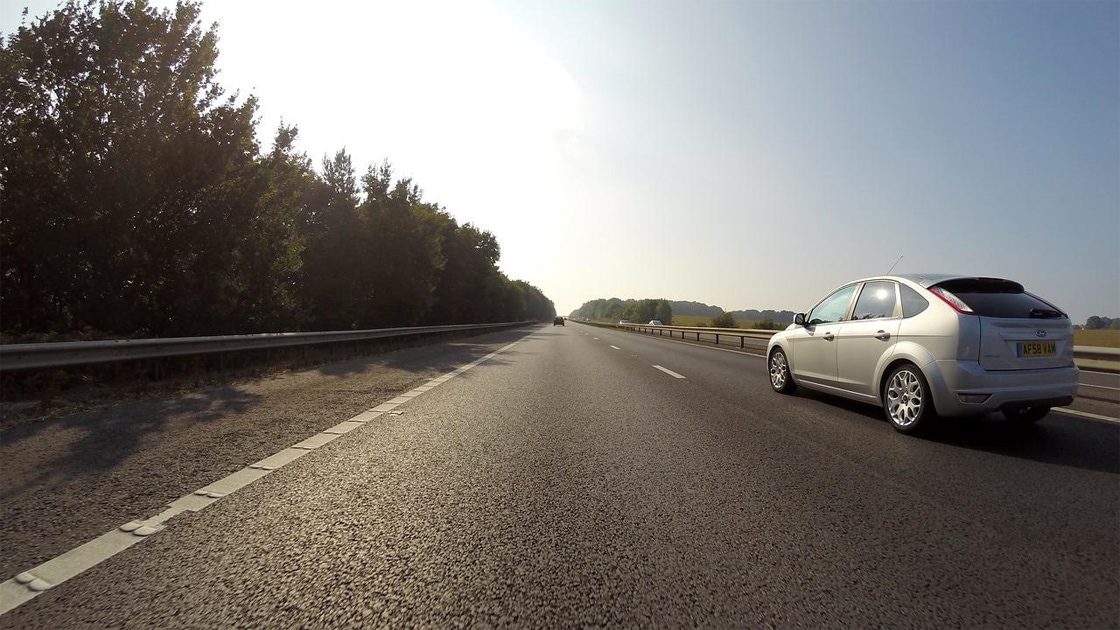The battery is an important element of any car. It gives the required energy for the engine to function and keeps the system working smoothly.
It may die when drivers leave the car lights on or the weather gets too cold. But can a car battery die while driving?
We’ll look into that question and give you the exact answer. You can also learn some tips to detect the problem. Let’s dig into the details!
Can A Car Battery Die While Driving?
Yes. The batteries in cars may stop working while you are still driving. You can blame this problem on the alternator, lack of power, or bad batteries.
There are certain signs for each issue. It would be best to check the cause first, and then you can come up with the right solution.
Out of fuel
When your vehicle’s battery runs out of power, it’s one of the most common reasons it dies while working. This problem is quite common.
It is critical to fuel your vehicle in order to restart the motor. You will be able to continue traveling once you have poured diesel or gasoline.
Listen for a buzzing sound when starting your automobile to figure out if the issue comes from the power. Nevertheless, a professional should examine the fuel gauge because there could be a misleading signal.
Alternator issue
If your vehicle’s alternator malfunctions or dies, it can make the engine shut down while you’re driving. It also indicates that the motor won’t start again.
Even if your vehicle is running, but the alternator has a problem, it will not generate enough power to refill the battery. This issue will eventually result in the cell draining out of energy.
There are obvious symptoms that your car’s alternator is faulty:
- The vehicle’s headlights are less brilliant;
- The ventilation starts to slow down;
- When you press the pedal, your automobile can’t produce as much energy.
The alternator and battery must work together to get the automobile moving.
If you notice the signs listed above, it signifies your alternator is delivering an S.O.S. message.
Immediately park your car and contact an auto-repairing service to solve the problem. The mechanic will come to help you out of this situation.

The alternator is an important component
Ignition switch
If your ignition switch malfunctions, you may encounter a variety of issues. Your automobile may not start, and you can’t use your stereo or other devices.
This issue occurs when the engine loses power owing to a worn-out ignition switch. The loss of power can cause the car to die while working.
Sensors
It’s important to understand that the sensors inside the automobile can identify both chemical and physical changes. Yet, sensors can break down and give inaccurate data, affecting the car’s efficiency and performance.
Faulty battery
If your vehicle won’t start, it’s probably because of a bad battery, which you won’t notice when the motor is working because the engine only needs it when going.
It’s crucial to remember that batteries don’t just die; they worsen over time. The issue is that most drivers do not realize they have a battery problem until it’s too late.
It would be best to replace the batteries every three to five years. Otherwise, they can’t handle a full charge and will deteriorate over time.

Make sure the cells are in good working order
Bad battery connections
If the connections become loose or rusted, the automobile may die while still running. In this case, the components don’t receive enough power to work.
Starting the engine takes longer, which is a clear indicator that the battery connections have got damaged.
A.S.D. relay
The Automatic Shutdown (A.S.D.) circuit in your car is in charge of transmitting electricity from the battery to keep your vehicle moving. It’s what operates the ignition coils and injectors, both of which are crucial in controlling your car.
The A.S.D., like any other component in an automobile’s engine, is prone to wear and tear. If it breaks down, there will be more problems, such as the vehicle running but stopping suddenly.

The damaged A.S.D is troublesome
Signs Of A Bad Car Battery
As discussed previously, faulty batteries cause some trouble for your vehicle. However, this issue is hard to detect. To treat it properly, check out these signs:
Sticking sound
If you notice a slow or quick ticking sound from beneath the hood, it’s one of the first symptoms that your vehicle battery isn’t functioning properly.
The fan should spin at high speed to cool down the batteries and maintain their performance. Hence, the fan makes a noise, but it sounds different from the ticking sound.
Faulty current
When your motor fails to run, but other electrical components are operational, take note because it’s a sign of bad batteries.
There may be a problem with the distributor cap, spark plug wire, or ignition coil that prevents the current from accessing the starter engine.
Buzzing noise
When you press the ignition switch, you may hear a loud buzzing noise from under the hood. The noise is another symptom of a poor battery because it may be wiring out elsewhere when trying to start.
In this situation, get the cell inspected, repaired, or replaced before going on any longer because you will get stuck if it dies altogether.
Dimming headlights
Dimming tail lights or headlights while the motor is working and other parts still work normally is the last sign that the batteries need to be replaced. However, each symptom may have a different source.
No sign
However, there are cases where the batteries die without any warnings or signs. You should check the parasitic drain for this issue.
A parasitic draw is an electronic gadget that constantly drains power over time. Electronic gadgets can be laptops, phones, phone chargers, or clocks that you use in your vehicle.

Inspect the system if you notice any bad signs
Why Do You Need to Replace Your Car’s Battery?
Even though they previously worked perfectly, old batteries are not suitable for use anymore. If you keep them there, they may cause more serious issues.
The electrical system in a vehicle is extremely complicated; numerous elements must all function together seamlessly for everything to operate properly.
The alternator charges the battery when the motor is running, which keeps it fueled between uses. The alternator also powers other components in your automobile, such as headlights, wipers, stereo, and so on.
When changing your batteries, get new ones instead of old ones. Otherwise, you will have to replace them again.
You should also make sure the new cell is the right voltage for your automobile. Check the model and brand for the right voltage level needed for your car.

Replace the broken part to keep the system working properly
Related:
- A Detailed Guide On How To Test Batteries With A Multimeter
- AGM batteries – All You Need to Know and Pros & Cons
- Can You Charge A Car Battery Through The Cigarette Lighter: Solution
Frequently Asked Questions
The following question and answers will give you more tips for solving battery-related problems. Let’s check!
1. How often should I replace my car’s battery?
It would be best to replace these cells every three to five years, depending on the brand and model.
It might be time for a new pack if the current one is draining quickly or needs a jump start too often.
2. Can I replace the car’s battery by myself?
You can complete this task yourself if you have the right tools, skills, and experience.
However, before changing any components, take your vehicle in for a thorough check-up with a professional mechanic to detect any potential problems.
If you do not know where to start your project, check this video for detailed instructions:
3. What happens if the battery dies while you are driving?
Dead batteries can cause a variety of problems, including:
- Your vehicle will stall while driving in the middle of the street.
- The engine will flip over several times while restarting.
- During chilly weather, the engine won’t start.
- The lights on the outside and inside do not work.
- The fan will turn on and off too slowly or not at all.
- If the radio catches a poor signal, it will turn off suddenly.
- There will be very little or even no warm water available.
- The cell’s components will be weak, damaged, loose, or worn out.
- There will be enough electricity to charge the injectors and spark plugs.
Conclusion
Can a car battery die while driving? Yes. If your car battery is dying quickly while driving, try looking into causes such as the cell, alternator, or sensors.
Having your automobile examined by a professional mechanic can help you detect any faults and save you bucks over the long term by avoiding more major damage.
Hopefully, you have learned beneficial information from our post. For any further information, please feel free to ask. Thank you for reading!
WHAT'S NEW
The best AGM battery chargers will be the ideal option to revive your flat battery without relying on professional help. These handy high-tech chargers are extremely beneficial because they offer...
The Genius Boost GB40 is popular because of its ability to help boost your vehicle when it has battery issues. Many of our customers wonder why the Noco GB40 can work greatly like so. So, we have...

